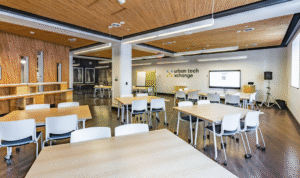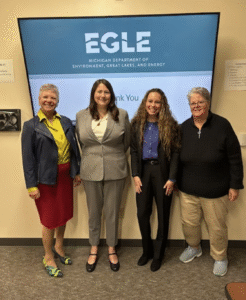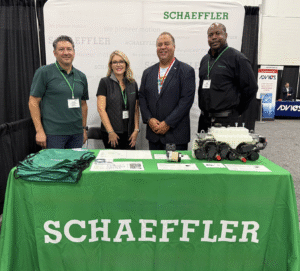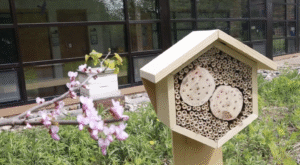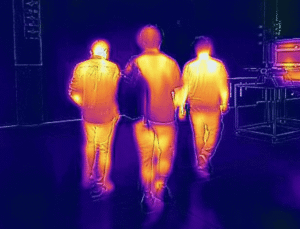
- Kim Kisner
- Business
- 06/20/2022
While Highlighting Key Women Owned Businesses and Those Making an Impact for Sustainability

SBND interviews Kerry C. Duggan,national political advisor and visionary climatech executive and former Obama White House official. Founder and CEO of SustainabiliD in Detroit, and recently named the founding director of the University of Michigan’s SEAS Sustainability Clinic, Duggan shares her thoughts on a local level, highlighting key women and businesses who are making an impact and offering advice on approaching sustainability.
Duggan is a board director of Perma-Fix (NASDAQ: PESI) and a senior advisor at RockCreek. She also sits on several corporate advisory boards, including Our Next Energy (ONE), Lux-Wall, Aclima, Walker-Miller, Arctaris Impact Investors, BlueConduit, and Commonweal Ventures. She is a senior fellow at the Federation of American Scientists and a member of the International Women’s Forum. Duggan’s current public service includes serving as an appointee to the (U.S.) Secretary of Energy’s Advisory Board (SEAB) under Secretary Jennifer Granholm and to the State of Michigan’s Council on Climate Solutions under Gov. Gretchen Whitmer.
Q: Kerry, please tell us about your current work.
A: I started SustainabiliD five years ago. It is a woman-owned,service-disabled veteran-owned, Detroit-based diverse small business working with game-changers to equitably solve the climate crisis.So, I have no small mission statement.
As such, I’ve spent the last five years working on climate solutions in two ways:
On the institutional side, I’m working to help develop the business model around place-based work for larger organizations. I have been appointed as the founding director of UM’s SEAS sustainability clinic in Detroit, and we are currently focused on three goals: To seek equitable and just solutions to the city’s most pressing sustainability-related issues; to lower operating costs—particularly in energy management for city operations—while reducing carbon emissions; and to support the delivery of services directly to the city and, through partner programs, to improve residents’ quality of life.
Second, I work with climate solution companies. These are the game-changers. For example, Our Next Energy (ONE) recently set a world record of EV miles traveled on a single charge: 752 miles, in December, in Michigan. This is a very big deal. I work to help these businesses navigate opportunities to scale with the speed that we all need to combat the climate crisis.
Q: Your work is largely around energy, climate, and environment.Where does your passion in these areas come from?
A: First, I’m a mom. Climate is the most urgent issue of our time, and I want to create a safer, more sustainable planet for the next generation.
Second, I have always loved doing my work in Detroit. My ancestors immigrated to Detroit from Ireland, so from a generational perspective, I try to give back to the place that has given my family so much. In this way, I’m very grounded in Detroit.
I was also blessed to spend many summers of my youth on the shores of the Great Lakes, home to 21% of the world’s fresh surface water. How lucky are we? I work to protect that and make it available for my kids.
Lastly, I have a basketball background, and the skills I gleaned from playing high-level hoops have transferred to my work. I’ll give an example. There is a move in basketball called the ‘give-and-go move’ where you give the ball away, then cut to the net, and get the ball back to make the lay-up.
In my work, I listen to the needs of leaders in communities, putting aside my point of view, because if I don’t listen to real and immediate needs, we are just talking past one another – and no one wins.
I put the give-and-go into practice in this way a lot.
Q: What is your vision behind SustainabiliD?
A: I grew up in a suburb of Detroit. Kids twenty miles down the road living in the city of Detroit faced injustices that I did notand conversely did not have the opportunities I had.
That’s been my charge: how can we change this and ensure the city is not only vibrant and safe but also offers equitable opportunities to everyone?
Q: The SustainabiliD team is predominantly women. What are your thoughts on women as leaders in sustainability?
A: I think if I created a pie chart of my calendar, we’d see that daily I’m mostly speaking with female leaders across the globe, who are mostly non-white. These are the voices that have been left furthest behind in every conversation to date on the planet.
I know I don’t have all the answers, but I always try to listen to people of color, women, other minorities, and people with underrepresented identities on what their needs are and try to help them position themselves to win the future. That’s where I’ve chosen to spend my time.
Q: Speaking of women, what Detroit female business leaders in the sustainability space can you point to who are making a difference?
A: Carla Walker-Miller. I work with a variety of companies but one that is an absolute stand-out is Walker-Miller Energy Services. In addition to what they do, which is to help relieve folks of energy burden by doing energy retrofits, Carla is an equitable economic development leader and a woman of color. I admire her not only for her company’s work but for her leadership.
She is a national figure living and working in Detroit making a great impact on equitable economic development.
Her work constantly informs what I’m doing now.
Carla Walker-Miller has hired Dr. Brandy Brown as Chief Innovation Officer for Walker-Miller. She is another amazing talent. Before joining Walker-Miller, Dr. Brown served as Climate & Energy Advisor within the Michigan Department of Environment, Great Lakes & Energy. She also serves as part of the Environmental Justice faculty for the University of Michigan’s School for Environment and Sustainability and as an appointee to Michigan’s National Resources Trust Fund Board.
A native Detroiter, Dr. Jalonne L. White-Newsome was recently tapped to be the new White House Council on Environmental Quality’s Senior Director for Environmental Justice. She has
tackled environmental challenges from a wide range of positions and perspectives. It’s bittersweet to not have her in our city, but she’s doing great work in the White House.
Jessica Robinson, a co-founder of Detroit Mobility Lab, is a deep thinker and a leader in mobility, now helping look around the corner of what’s coming next – with a passion for Detroit leading in that space.
Anika Goss-Foster with Detroit Future City is focused on important work analyzing equitable economic development and determining where the gaps are and making that information available to all stakeholders who can drive change.
Kate Gasparro, Director of Land Development and Director of Urban Strategy and Innovation for Bedrock is a true thought leader, whom we are lucky to have in our midst!
Raquel Garcia is the Executive Director at Southwest Detroit Environmental Vision (SDEV). She forges atypical partnerships around the 48217 zip code, an area with widely understood air quality issues and is doing amazing work there.
Rising star and holder of five degrees, Deeana Ahmed of One Next Energy is giving global talks on equitable women’s leadership issues and pushing the envelope regarding sustainable materials in the EV supply chain.
The list goes on. I’m loving working with these global fixtures who are Detroit-based or born.
Q: Please speak about your time with the Obama-Biden Administration and how that experience informs your current work in Detroit.
A: It’s been a virtuous cycle. Detroit has largely informed my work in Washington and vice versa. While in DC, I kept my foot in the door in Detroit and was vocal about it.
I was lucky enough to work as deputy director of the Detroit task force in Washington before, during, and after the bankruptcy, and part of that work was leading the streetlight conversion.
Being part of the community that you are doing the work for is always more impactful than a top-down approach. I’ve loved and continue to love my work in Detroit.
Q: What are the most impactful things a business can do to make a difference?
A: Right now, there is a big conversation around talent. Companies need to build their workforce around adding real tangible value – and do a gut check on hires to ensure they are inclusive and offer diverse perspectives and experience.
There is a similar conversation around diversity on corporate boards. It’s been proven that a more diverse board gets better results. This same attitude about the workforce needs to be applied.
Q: Where should a business start if they are new to sustainability?
A: There is a multitude of resources at the University of Michigan, including at SEAS and the Erb Institute. Businesses could engage with SEAS Sustainability Clinic to obtain interns or master’s level students. We’re working on bringing subject matter experts to the clients and making the resources of the #1 public university available to Detroit in real and tangible ways. Contact seas@umich.edu.
Q: Lastly, what advice would you give individuals working within businesses in Detroit when approaching sustainability work?
A: Approach the work with these five ingredients:
- Listen first to their pain points
- Provide capacity to solve said pain points
- Bring in technical assistance or subject matter expertise
- Identify or provide resources
- Celebrate the wins!
I take this from my lived work experience, and it is how I approach my work every day.
Be sure to subscribe to our newsletter for regular updates on sustainable business practices in and around Detroit.
Kim Kisner
- All
- Business
- Community
- Education
- Events

Founded in 1965, Gensler is a global architecture and design firm working across sectors including urban development, commercial real estate, and civic infrastructure. SBN Detroit sat down with Najahyia Chinchilla, senior associate and sustainability consultant, to discuss mass timber, embodied carbon, and what sustainable construction means for Southeast Michigan. Q: Why is wood re-emerging right now as a serious option for large-scale, urban construction? A: Mass timber blends strength, sustainability, and design quality in ways few materials can. Wood has...
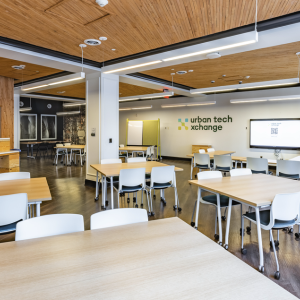
Now in its fourth year of operation, Urban Tech Xchange (UTX) has become a living laboratory where emerging technology startups can test, refine, and validate smart urban systems in real-world conditions. Launched through a collaboration between Bedrock, Bosch, Cisco, and Kode Labs, UTX builds on the foundation of the Detroit Smart Parking Lab (founded earlier by Bedrock, Ford, MEDC, and Bosch) expanding its scope beyond parking into logistics,...
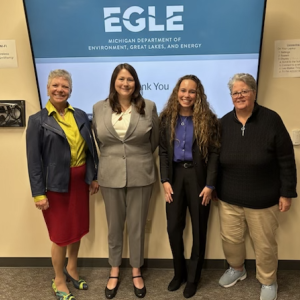
Butzel is one of Michigan’s longest-standing law firms, advising businesses across industries on regulatory compliance, environmental law, and complex commercial matters. As environmental expectations evolve alongside shifting regulatory realities, the firm plays a key role in helping companies navigate both legacy challenges and emerging risks. SBN Detroit interviewed Butzel shareholder Beth Gotthelf to discuss how environmental compliance, sustainability, and innovation are intersecting today — particularly in Southeast Michigan...


